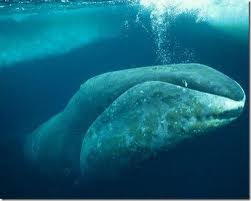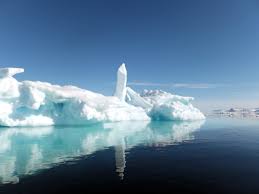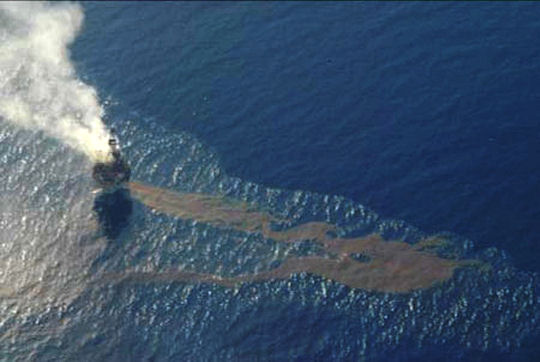|
|
|
|
|
|
|
|
No Arctic-science events are announce for today.
There will be no update tomorrow-- happy July 4th!
|
Media
 Bowhead Whales and Narwhals Most Vulnerable to Arctic Shipping. Bowhead Whales and Narwhals Most Vulnerable to Arctic Shipping. Bowhead whales are the marine mammals most vulnerable to disruption from increased ship traffic in waters off Alaska, a new study has concluded. Across the Arctic, narwhals are the most vulnerable. The study, undertaken by researchers at the University of Alaska Fairbanks and the University of Washington, looked at 80 sub-populations of seven marine mammals that live in the Arctic. It identified risks on or near major shipping routes in September, a month when Arctic seas have the most open water. Maritime Executive
What Will the Future Hold for Arctic Economics? The economic potential of the Arctic is vast, but the complexities of the region must be considered when analyzing the future of the Arctic. While the region north of the Arctic Circle is commonly viewed as a singular expanse, the reality is rather different. Within the Arctic - and amongst the eight Arctic nations - there exists noteworthy similarities but also tremendous variations. Indeed, the Arctic is a diverse part of the world that would be best characterized as several different subregions, all with unique resources, populations, accessibility, geostrategic importance, and challenges. It is critical to analyze economic drivers and political factors across the High North in order to evaluate the economic potential of the region, understand national security interests, and develop appropriate Arctic policy. Center for International Maritime Security
 What are the Impacts of Thawing Frozen Carbon on the Arctic Ocean? What are the Impacts of Thawing Frozen Carbon on the Arctic Ocean? he UK Natural Environment Research Council (NERC) and Germany's Federal Ministry of Education and Research have joined forces to launch an investigation into the impact that thawing frozen carbon has on the Arctic Ocean. The Changing Arctic Ocean research program will investigate the impact of thawing permafrost and the subsequent release of frozen carbon on the Arctic Ocean. It also aims to investigate how climate change is affecting the ocean. SCITECH EUROPA
N unavut Suicides are a 'Public Health Emergency' Iqaluit City Councilor. n the wake of the recent suicides of two young men, an Iqaluit city councilor is demanding action from both the federal and territorial governments to respond to what he calls an ongoing crisis in Nunavut. "Suicide is a public health emergency in Nunavut and not enough is being done to stem the tide," said Iqaluit councilor Kyle Sheppard in a statement he read to Tuesday night's city council meeting. Nunatsiaq Online
|
|
Future Events
 Coastal Response Research Center Requests Input on the State of Science on Dispersant Use in the Arctic. The Coastal Response Research Center (CRRC) recently collected statements and reports on five topic areas related to dispersant use in the Arctic: efficacy and effectiveness; physical transport and chemical behavior; degradation and fate; eco-toxicity and sublethal impacts; and, public health and food safety. CRRC request written input on the statements the scientists made on the state-of-the-science regarding dispersant use, particularly as it applies to Arctic waters. Written comments are requested by July 13th. More information on this initiative is available here. Coastal Response Research Center Requests Input on the State of Science on Dispersant Use in the Arctic. The Coastal Response Research Center (CRRC) recently collected statements and reports on five topic areas related to dispersant use in the Arctic: efficacy and effectiveness; physical transport and chemical behavior; degradation and fate; eco-toxicity and sublethal impacts; and, public health and food safety. CRRC request written input on the statements the scientists made on the state-of-the-science regarding dispersant use, particularly as it applies to Arctic waters. Written comments are requested by July 13th. More information on this initiative is available here.
17th International Congress of Circumpolar Health (ICCH17), August 12-15, 2018 (Copenhagen, Denmark). The ICCH congresses are held every third year in different locations in the circumpolar area and represent the largest scientific meetings worldwide on circumpolar health. The ICCH congresses serve as the primary source of information exchange and scholarly communication in issues relating to circumpolar health. More than 750 participants generally register and participate in each Congress, and more than 400 scientific papers or posters are usually presented.
UArctic Congress 2018, September 3-7, 2018 (Oulu and Helsinki, Finland). The UArctic Congress 2018 will bring together key UArctic meetings and a science conference into one single gathering, including business meetings of the Council of UArctic, Rectors' Forum, Student Forum, and Thematic Networks & UArctic Institutes Leadership Team. The Congress is an integral part of the Finland's Arctic Council chairmanship program, and open to the public. The event will highlight the themes and priorities of the Finnish chairmanship, including the goals of the United Nations' 2030 Agenda for Sustainable Development, and the Paris Agreement under the UN Framework Convention on Climate Change.
Scientific Exploration of the Arctic and North Pacific (SEA-NorP), September 25-27, 2018 (Mt. Hood, Oregon USA). This workshop will include discussion of hypotheses that can be tested by scientific drilling in the region, the technology necessary to achieve those goals, ideal sites for drilling based on existing data, and where additional site survey data is needed. The goal of the workshop organizers is that multiple proposals will be initiated at the workshop, both for full cruise legs and for shorter, targeted expeditions around the following themes: ocean gateways, geohazards, volatile cycling, ice histories at transition zones, biosphere and climate.
The second Arctic Biodiversity Congress is hosted by the Conservation of Arctic Flora and Fauna (CAFF), the biodiversity working group of the Arctic Council, and the Ministry of the Environment, Finland. The second Arctic Biodiversity Congress will build on the success of the first Congress, held in 2014 in Trondheim, Norway, and will bring together scientists, policymakers government officials, Indigenous representatives, Traditional Knowledge holders, industry, non-governmental organizations, and others to promote the conservation and sustainable use of Arctic biodiversity.
|
|

  
4350 N. Fairfax Drive, Suite 510
Arlington, VA 22203, USA
External links in this publication, and on the USARC's World Wide Web site ( www.arctic.gov) do not constitute endorsement by the US Arctic Research Commission of external Web sites or the information, products or services contained therein. For other than authorized activities, the USARC does not exercise any editorial control over the information you may find at these locations. These links are provided consistent with the stated purpose of this newsletter and the USARC Web site.
|
|
|
|
|
|
|
|
|
 Bowhead Whales and Narwhals Most Vulnerable to Arctic Shipping. Bowhead whales are the marine mammals most vulnerable to disruption from increased ship traffic in waters off Alaska, a new study has concluded. Across the Arctic, narwhals are the most vulnerable. The study, undertaken by researchers at the University of Alaska Fairbanks and the University of Washington, looked at 80 sub-populations of seven marine mammals that live in the Arctic. It identified risks on or near major shipping routes in September, a month when Arctic seas have the most open water. Maritime Executive
Bowhead Whales and Narwhals Most Vulnerable to Arctic Shipping. Bowhead whales are the marine mammals most vulnerable to disruption from increased ship traffic in waters off Alaska, a new study has concluded. Across the Arctic, narwhals are the most vulnerable. The study, undertaken by researchers at the University of Alaska Fairbanks and the University of Washington, looked at 80 sub-populations of seven marine mammals that live in the Arctic. It identified risks on or near major shipping routes in September, a month when Arctic seas have the most open water. Maritime Executive What are the Impacts of Thawing Frozen Carbon on the Arctic Ocean? he UK Natural Environment Research Council (NERC) and Germany's Federal Ministry of Education and Research have joined forces to launch an investigation into the impact that thawing frozen carbon has on the Arctic Ocean. The Changing Arctic Ocean research program will investigate the impact of thawing permafrost and the subsequent release of frozen carbon on the Arctic Ocean. It also aims to investigate how climate change is affecting the ocean. SCITECH EUROPA
What are the Impacts of Thawing Frozen Carbon on the Arctic Ocean? he UK Natural Environment Research Council (NERC) and Germany's Federal Ministry of Education and Research have joined forces to launch an investigation into the impact that thawing frozen carbon has on the Arctic Ocean. The Changing Arctic Ocean research program will investigate the impact of thawing permafrost and the subsequent release of frozen carbon on the Arctic Ocean. It also aims to investigate how climate change is affecting the ocean. SCITECH EUROPA 

